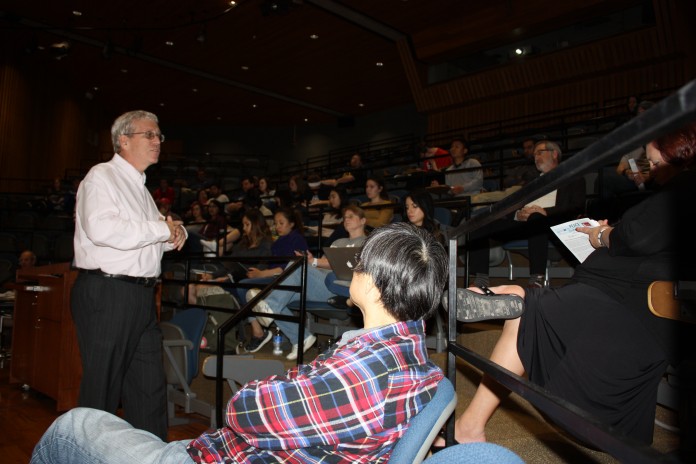
by Humphrey Musila
Staff Reporter
Steven Youngblood, director of the Center for Global Peace Journalism at Park University, gave a presentation at the college on Thursday, April 21. Youngblood teaches peace journalism at Park University and explains that peace journalism is when editors and reporters make choices that improve the prospects of peace.
“The answer is giving the voiceless a voice by providing more complex, more complete coverage of refugees,” said Youngblood. “So if you look at coverage in a place like Turkey or Lebanon, the coverage of refugees is almost entirely negative. So what a peace journalist could do is seek the balance at coverage and to offer counternarratives.”
Turkey plays a host to millions of Syrians who have been displaced as a result of the ongoing conflict in that country. These refugees have been forced to flee their country in search of a better place they can call home and live in peace. A majority of the refugees are women and children who crossed the borders with an aim to protect their lives.
The media coverage of Syrian refugees has been on the receiving end of criticism that the media is not positively covering the crisis faced by the refugees that has made refugees’ lives more difficult. In essence the media has failed to tell the full story. For the world to better understand the fate of these refugees, the media has a responsibility of coming up with better ways of approaching the issue of immigrants, especially the Syrian refugees in Turkey.
“One of the things that I do [that] may be different from some is in my peace journalism classes we bring teachers and journalists from around the world,” said Youngblood. “So I use Skype extensively. So Professor Oginga from Rongo University, for example, will speak via Skype to my class every year. Colleagues from Lebanon, colleagues from Turkey, Mexico and colleagues from around the world who are talking about the challenges of journalism in their environment and the applicability of peace journalism.”
Outside the classroom every year or two, Youngblood engages students by taking several of them on study abroad trips for peace journalism. He has taken students to countries such as Cyprus, Uganda and Turkey.
Youngblood is the author of the upcoming book “Peace Journalism Principles and Practice: Responsibly Reporting Conflicts, Reconciliation, and Solutions.” The most recent peace journalism textbook was written 10 years ago by a different author.
“My book that is coming out in September is the first American peace journalism textbook,” said Youngblood. “Certainly I feel honored to be the first one to have written this kind of textbooks for American university audiences.”
Several students and staff attended both presentations. Some of the students in attendance gained a lot from the presentation.
“The presentation made me realize there are a lot of things that the media like to exaggerate and the words they use are dehumanizing … so this is really a good effort to counter that,” said international student Marcus Wong. “I will try to spread awareness about peace journalism … and I might just take the peace journalism class he talked about because it’s pretty interesting.”
Moustafa Khamis, a student at the college, is from Egypt, a country where journalism is controlled by the government, and said there is no media freedom in Egypt and believes he can use social media to promote peace journalism in his home country.
“I like the way he explains what journalism should be because we all know that it has a problem,” said Khamis. “I am from a third-world country and I know that journalism unfortunately cannot change that much unless people are willing to accept to be open-minded and have a different opinion.”
Students at the college can take the initiative of being more involved in matters to do with peace journalism not only in the U.S. but around the world as well.





















